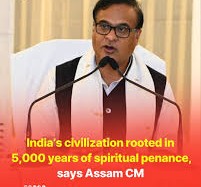Assam Chief Minister Himanta Biswa Sarma asserted that India was not born in 1947 but is a 5,000-year-old civilization built on penance, knowledge, and cultural continuity. Speaking during a state event, Sarma emphasized viewing India through its civilizational lens rather than colonial frameworks, urging youth to take pride in their heritage.
India’s Legacy Extends Beyond 1947: Himanta Biswa Sarma
In a strong articulation of India’s civilizational identity, Assam Chief Minister Himanta Biswa Sarma declared that India did not begin its journey in 1947 but carries the weight and wisdom of 5,000 years of continuous culture. He was addressing a public event in Guwahati ahead of Dussehra celebrations, where he reflected on India’s spiritual foundation and timeless continuity.
Sarma said that the country’s essence lies in its ancient values, saints, rishis, and thinkers. The modern Indian state, in his view, is merely the latest expression of a long lineage stretching from the Vedic age to today’s democracy. He urged citizens—especially young Indians—to understand the nation as a civilization reborn, not merely a post-colonial entity.
Key Context and Reactions
The Chief Minister’s remarks come amid ongoing discussions among political and cultural leaders about reclaiming civilizational narratives and decolonizing education. According to Hindustan Times’s reporting from the event, Sarma connected India’s freedom struggle to its much older cultural journey, calling independence “a reconnection with our eternal identity, not the beginning of our nationhood.”
The statement has drawn attention across political and academic circles, with many interpreting it as a call for deeper cultural reawakening. Some observers believe this aligns with the broader national narrative of positioning India as a timeless civilizational state rooted in spirituality, philosophy, and resilience.
Notable Updates
Himanta Biswa Sarma emphasized that India’s civilizational journey spans over 5,000 years, tracing lineage from Vedic culture to modern governance.
He described 1947 as a return to self, not the birth of a new political identity.
The Assam CM urged youth to learn Indian history through indigenous lenses rather than colonial textbooks.
His address underlined the importance of cultural self-esteem and knowledge preservation amid modernization.
The statement is seen as part of India’s broader narrative of reclaiming historical confidence and redefining identity beyond colonial timelines.
Sources: Hindustan Times; Times of India

